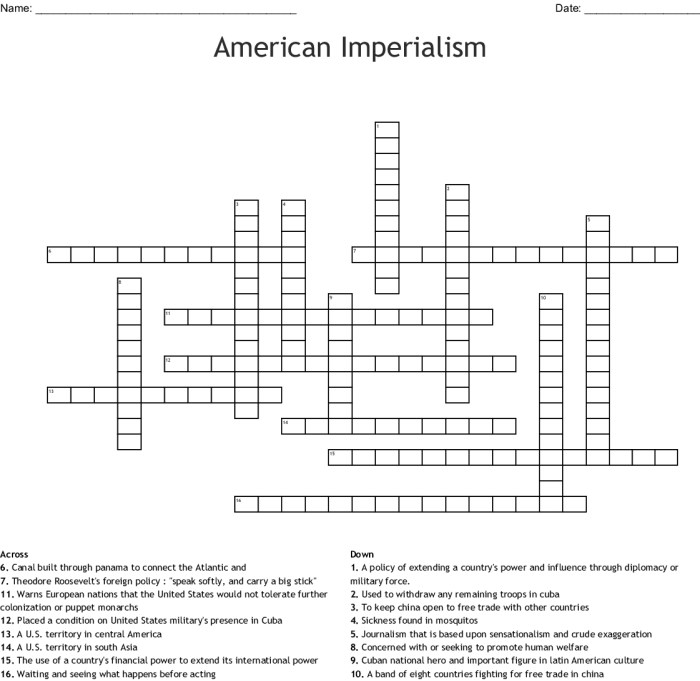Embark on an intellectual journey with the imperialism word search answers key, a comprehensive guide that deciphers the intricate tapestry of imperialism’s historical and contemporary manifestations. This meticulously crafted resource unravels the complexities of imperial expansion, its impact on indigenous populations, and the enduring legacy it has left on the global stage.
Delve into the motivations and justifications that fueled imperial ambitions, exploring the diverse methods employed to establish and maintain control over territories. Witness the devastating consequences faced by indigenous cultures, as their land, resources, and cultural identity were systematically eroded.
Examine the economic and political implications of imperialism, both for the imperial powers and the colonized regions.
Definition and Historical Context
Imperialism is a policy or practice by which a country increases its power and wealth by acquiring and maintaining colonies or other territories. It is a form of domination in which one country exerts political, economic, and cultural control over another.
The historical origins of imperialism can be traced back to the 15th century, when European powers began to explore and colonize the Americas, Africa, and Asia. This period of European expansion was driven by a number of factors, including the search for new trade routes, the desire for wealth and resources, and the spread of Christianity.
Motivations and Justifications for Imperial Expansion
The motivations for imperial expansion were complex and varied. Some countries were motivated by economic factors, such as the desire to acquire new markets for their goods or to secure access to raw materials. Others were motivated by political factors, such as the desire to increase their power and prestige or to protect their existing colonies.
The justifications for imperial expansion were also varied. Some Europeans argued that they had a duty to “civilize” the “backward” peoples of the world. Others argued that imperialism was necessary to protect their own countries from foreign threats.
Methods and Practices: Imperialism Word Search Answers Key
Imperial powers employed a range of methods to establish and maintain control over territories. These included:
- Military conquest:Direct military force was often used to subdue local populations and impose imperial rule.
- Economic coercion:Imperial powers controlled trade and access to resources, using economic incentives or threats to gain political influence.
- Political manipulation:Imperialists divided local populations, exploited existing social and political hierarchies, and installed puppet regimes to facilitate their rule.
- Cultural assimilation:Imperial powers sought to reshape local cultures and identities to align with their own values and beliefs.
Imperialism also involved the implementation of specific political, economic, and social practices. These included:
- Colonial administration:Imperial powers established centralized bureaucracies to govern their colonies, often with a heavy emphasis on law and order.
- Economic exploitation:Colonies were often seen as sources of raw materials and cheap labor, and their economies were restructured to serve the needs of the imperial power.
- Social stratification:Imperialists often created social hierarchies that privileged Europeans and discriminated against local populations.
- Cultural suppression:Imperial powers often suppressed local cultures and languages, and promoted their own cultural norms and values.
Economic and Political Consequences

Imperialism has significant economic and political consequences for both imperial powers and colonized regions.
Economic Consequences
- Benefits for Imperial Powers:Imperial powers often exploited colonies for their natural resources, cheap labor, and new markets for their goods. This led to economic growth and prosperity in the imperial countries.
- Costs for Imperial Powers:Imperial powers also incurred significant costs in maintaining their colonies, including the expense of military forces, administration, and infrastructure development.
- Benefits for Colonized Regions:In some cases, imperialism brought economic benefits to colonized regions, such as the introduction of new technologies, infrastructure, and education. However, these benefits were often limited to a small elite.
- Costs for Colonized Regions:Colonization often led to the disruption of traditional economic systems, the exploitation of natural resources, and the impoverishment of local populations.
Political Consequences
- Political Instability:Imperial rule often led to political instability in colonized regions. The imposition of foreign rule and the suppression of local autonomy created resentment and resistance.
- Conflicts:Imperialism often led to conflicts between imperial powers and colonized regions, as well as between different groups within colonized societies.
- Nationalism:Imperialism often stimulated nationalist movements in colonized regions, as local populations sought to regain their independence.
- Decolonization:In the 20th century, imperialism faced growing opposition from nationalist movements and international pressure. This led to the decolonization of most colonies.
Forms of Imperialism
Imperialism manifests in diverse forms, each with its unique characteristics. Understanding these variations is crucial for comprehending the multifaceted nature of imperial control.
The primary forms of imperialism include colonialism, protectorates, and spheres of influence.
Colonialism
Colonialism entails the direct political and economic control of a territory by a foreign power. The colonizing nation establishes its own administration, laws, and economic system in the colony, often exploiting its resources and labor force.
Protectorates
Protectorates are territories under the protection of a foreign power, which manages their foreign affairs and defense while allowing them to retain some degree of internal autonomy. The protectorate typically has its own government and laws, but the foreign power exercises significant influence over its policies.
Spheres of Influence
Spheres of influence are regions where a foreign power has exclusive economic and political privileges, without formally annexing the territory. The foreign power may control trade, investment, and other aspects of the region’s economy, while the local government retains nominal independence.
These forms of imperialism share the common feature of external control over a territory, but they differ in the extent and nature of that control. Colonialism represents the most direct and comprehensive form of imperial domination, while spheres of influence allow for a greater degree of local autonomy.
Resistance and Decolonization
Imperial rule faced various forms of resistance and opposition. These ranged from armed uprisings and guerrilla warfare to nonviolent civil disobedience and political agitation.
Nationalism and Anti-Colonial Movements, Imperialism word search answers key
Nationalism played a significant role in fueling resistance to imperial rule. As colonized peoples developed a sense of national identity and pride, they began to resent foreign domination and aspire for independence. Anti-colonial movements emerged, led by intellectuals, activists, and political leaders who advocated for self-determination and the end of colonial rule.
Decolonization Process
The decolonization process, which began in the mid-20th century, was a complex and often protracted struggle. It involved a combination of factors, including the rise of nationalism, the weakening of imperial powers, and international pressure. Through negotiations, armed conflicts, and other forms of resistance, colonized territories gradually gained independence and established their own sovereign nations.
Contemporary Imperialism

Imperialism continues to manifest in the modern world through neo-imperialism, where powerful nations exert their influence over less developed regions through economic, political, and cultural means.
Economically, neo-imperialism involves the exploitation of resources, control of markets, and unequal trade relationships. Politically, it manifests in the imposition of foreign policies, support for favorable regimes, and military interventions. Culturally, neo-imperialism involves the dissemination of dominant ideologies, values, and cultural norms.
Economic Influences
- Resource extraction and exploitation
- Unequal trade agreements
- Foreign aid and investment as a means of control
- Imposition of economic policies
Political Influences
- Support for favorable regimes
- Imposition of foreign policies
- Military interventions
- Political and diplomatic pressure
Cultural Influences
- Dissemination of dominant ideologies
- Promotion of cultural values and norms
- Control over media and education
- Cultural homogenization
Impact on Global Affairs

Imperialism has profoundly shaped the modern world, leaving a lasting legacy in terms of political boundaries, economic development, and cultural diversity.The arbitrary demarcation of borders during the colonial era has created enduring tensions and conflicts in many regions. These artificial divisions often disregarded ethnic, linguistic, and cultural affinities, leading to ongoing disputes and challenges in nation-building and regional stability.Moreover,
the economic consequences of imperialism have been profound. Colonial powers exploited the resources and labor of their colonies, leading to uneven development and economic dependency. The extraction of raw materials and the imposition of cash crops disrupted traditional economies, creating a cycle of poverty and underdevelopment in many former colonies.Imperialism
has also had a significant impact on cultural diversity. The spread of European languages, religions, and customs during the colonial period has resulted in a complex interplay of cultural influences. While some indigenous cultures have been preserved and revitalized, others have been marginalized or suppressed, leading to cultural homogenization and the loss of linguistic and cultural diversity.
General Inquiries
What is the definition of imperialism?
Imperialism refers to the policy or practice by which a country extends its power and influence through the establishment of colonies, protectorates, or other forms of control over foreign territories.
What were the main motivations for imperial expansion?
Imperial expansion was driven by a complex interplay of factors, including economic gain, political power, and cultural superiority.
What were the consequences of imperialism for indigenous populations?
Imperialism had devastating consequences for indigenous populations, leading to the loss of land, resources, cultural identity, forced labor, displacement, and violence.
